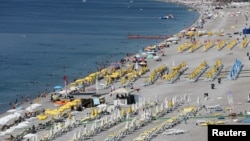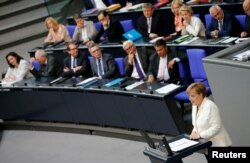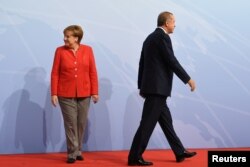Germany's Foreign Ministry has warned its citizens thinking of traveling to Turkey that they risk arbitrary detention even in Turkish resort areas. The hardening of the travel advisory follows detentions of Germans by Turkish authorities that are considered by Berlin to have been politically motivated.
A dozen Germans are being held as political prisoners in Turkey, according to the German government — the latest flashpoint in deteriorating relations.
Those arrested include Turkish-German journalist Deniz Yucel, a correspondent for the German daily Die Welt, who has been detained without charge for more than 200 days.
Germans arrested
While falling short of the kind of travel warnings issued for war zones, the latest advisory, triggered after the arrests of two Germans at Antalya Airport last week, has been considerably sharpened and will impact travel insurance premiums for those visiting Turkey. “There is a risk of similar detentions in all parts of Turkey, including in tourist regions," the advisory cautions.
“We can't take from tourists the decision whether to travel or not,” German Foreign Minister Sigmar Gabriel said. “But we have described in detail what you should be aware of before you go.”
The advisory, issued Tuesday, is unlikely to dull the war of words between Berlin and Ankara.
On Tuesday, German Chancellor Angela Merkel told parliament, in its last session before Germany’s federal elections on September 24, that if reelected, she will press European Union leaders at a scheduled October meeting of the bloc to review whether to suspend or terminate Turkish accession talks.
She accused the government of President Recep Tayyip Erdogan of “increasingly leaving the path of the rule of law.”
Turkish officials reacted angrily Monday to a weekend election debate between Merkel and her center-left opponent Martin Schulz, in which she said, “The fact is that Turkey should not become an EU member.”
Reactions to German debate
Turkish officials condemned Merkel and Schulz for what they described as anti-Turkish rhetoric during the broadcast debate. In a tweet, Ibrahim Kalin, an Erdogan spokesman, said Merkel was seeking to divert attention from discrimination and racism in Germany.
And pro-government newspapers in Turkey have echoed the line coming from the Turkish presidency.
Writing in the Daily Sabah, commentator Cemil Ertem said German business was still investing heavily in Turkey and ignoring Berlin’s “fascist rhetoric.”
“Turkey will be coldblooded against these unjust attacks and will continue to cooperate with both the German people and the German business world, and will condemn these discourses, which are reminiscent of the Nazi era,” he said.
German-Turkish relations have been on a downward spiral for two years, with clashes over the refugee crisis roiling Europe, authoritarian politics and civil liberties in the wake of the 2016 failed military attempt to unseat Erdogan, and the Syrian war.
German politicians reacted with anger to a recent call by Erdogan for Turkish expatriates living in Germany to boycott the upcoming elections, dubbing German leaders as “enemies of Turkey.”
“Relations began to sharply sour after authorities banned Turkish politicians from holding campaign rallies in Germany ahead of a constitutional referendum in Turkey” earlier this year, said Gonul Tol of the Middle East Institute, a Washington-based research policy group.
Difficult integration
Germans are most indignant about what they see as Erdogan’s bid to garner the support of Turkish nationalists by straying into domestic German politics and urging the more than 3 million Turks living in Germany to resist integration.
“Germany is struggling to integrate Turkish immigrants into German society,” she says. “Many of them still identify themselves with Turkey, and live in parallel societies where they watch Turkish television, speak Turkish, and have little interaction with the broader German society.”
On Thursday, German-Turkish relations are likely to be aggravated even more with the start of an espionage trial in Hamburg, which is raising questions about Turkish intelligence operations in Germany.
An alleged Turkish spy sent to Germany to track a prominent European Kurd, Yuksel Koc, told his German police interrogators that he received orders to monitor the Kurds in Germany and alleged the Turkish intelligence agency, or MIT, had planned to murder Koc and another Kurd.
According to Der Spiegel magazine, it is not clear if the agent, Mehmet Fatih S., made the allegation about MIT’s assassination plan to curry favor with prosecutors.
The 32-year-old faces a five-year prison term, if found guilty for his surveillance activities. Turkish officials dismiss his allegations of assassination plots as lies.
Nonetheless, the Hamburg trial is fueling alarm in Berlin about Turkish intelligence activity. In March, tensions between Berlin and Ankara mounted rapidly over claims that Turkey has been using Islamic preachers in Germany to spy on supporters of Fethullah Gulen, the U.S.-based cleric who President Erdogan accuses of orchestrating the failed July 2016 coup against him. Gulen denies the allegation.
Germany authorities alleged clerics affiliated with the Turkish-Islamic Union for Religious Affairs (DITIB), Germany's largest Islamic umbrella group, which is tied to the Turkish government's Directorate of Religion, or Diyanet, had been ordered to spy on Erdogan's political opponents. They also argued the spying was part of a broader espionage effort extending to other European countries, including neighboring Austria, with imams hiding behind religion to snoop on behalf of Ankara. Turkey denies the allegations.
Last month, Foreign Minister Gabriel said he feared that mosques supported by the Turkish government had become political tools for Erdogan and were acting as agents of division in Germany.








